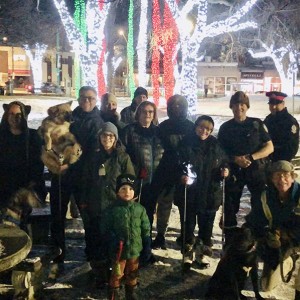Urban Beekeeping

My staple diet consists of homemade granola bars and energy balls, so my household goes through A LOT of honey. We all know that the world’s bee population is in peril, and that we need bees to sustain our food supply. So, it seemed like a win–win for my husband and me to become urban beekeepers.
Before long, we had taken the class, registered with the City, and ordered our supplies. On the spring day I went to pick everything up from Beemaid (a familiar brand to most grocery shoppers in Edmonton, but also a co-op where small producers can sell their honey and buy bee keeping supplies), the staff was pretty skeptical that I was picking up an un-built hive and a tube of hungry bees at the same time. Apparently this is not the normal order of operations, but hey – there’s a first time for everything!
After a few hours of assembly, we suited up and managed to get everyone into the hive without any major disasters. Over the next few months, we consulted our books many times to make sure we were doing everything we learned about in class. Despite our fumblings, the bees worked their miracles, and at the end of the summer we had a few frames of delicious, clean, flowery-tasting honey. City bees tend to gather pollen from fruit trees and flowering plants (as opposed to their canola gathering country cousins) so the flavour tends to be pretty unique.
Our honey yield in the first year was pretty small since the bees were busy building honeycomb and getting their hive set up. The second year our yield was double the first (about 35 half pint jars). As an added bonus, the flavour and yield from all our fruit plants was amazing as well. We were on a roll and saving the world at the same time!
Sadly, things did not end on a high note. We had to move our hive and it did not survive the second winter. It was devastated by a wasp attack in late fall, followed by an early snow and an extra cold winter. Alberta beekeepers have only relatively recently begun over-wintering their hives. It used to be a matter of course that the hive died off over winter and new bees were brought over in spring (our bees came from New Zealand, which we were told are friendlier than grumpy American bees).
All in all, we really enjoyed our beekeeping experience and will definitely be starting up again in spring now that we are moved and settled. Every time I look at our hive with its custom paint job courtesy of my five-year old niece, I think of our calmly buzzing bees, delicious honey, happy plants, and look forward to next spring.
Lindsay Brommeland is a McCauley resident of 14 years and will try anything once.







